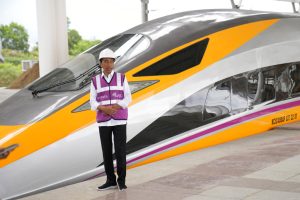ASEAN Beat | Economy | Southeast Asia
An official told parliament this week that the project’s final overrun was $1.2 billion, down from more than $2 billion previously predicted.
Indonesian President Joko Widodo stands near a newly-unveiled Comprehensive Inspection Train (CIT) unit during his visit to the Jakarta-Bandung Fast Railway station in Tegalluar, West Java, Indonesia, Thursday, Oct. 13, 2022.
Credit: AP Photo/Dita Alangkara
Indonesia’s government says it has finalized the cost overruns on a China-backed high-speed rail line on the island of Java, as the project moves toward completion after repeated delays.
Addressing parliament on Monday, Kartika Wirjoatmodjo, the deputy minister of state-owned enterprises, said that the Indonesian and Chinese governments have agreed on a cost overrun of 18 trillion rupiah (around $1.2 billion), down from the more than $2 billion previously expected. “There are several items that they are still reviewing regarding taxes, frequency clearing fees,” he said, “but we have agreed on the numbers.” He did not say when the meeting took place, though negotiations were reported to be in their final phase in the middle of last month.
The Jakarta-Bandung High-Speed Railway, a key part of Beijing’s headline Belt and Road Initiative (BRI), is on the verge of completion. In November, during the G-20 Summit in Bali, Indonesian President Joko “Jokowi” Widodo and China’s Xi Jinping witnessed a test of the railway. At the time, an official said that the track laying work was expected to be completed by March of this year, with completion to come in June.
Further details, including an additional loan from the China Development Bank to cover the extra costs, are to be finalized this month, Kartika added. “So the rapid train project can finish according to the timeline, which is June or July 2023,” he said.
This will bring to an end a construction process that has been beset by delays and cost overruns of various kinds. In September 2015, when President Joko Widodo’s administration awarded the contract for the 145-kilometer line to a consortium of Chinese and Indonesian state-owned enterprises known as Kereta Cepat Indonesia China (KCIC), the project was initially slated to be completed by 2018, at a cost $5.5 billion.
Last year, however, the state-owned railway operator Kereta Api Indonesia (KAI), which is part of the KCIC consortium, announced that the estimated cost of the project had blown out to 113 trillion rupiah ($7.36 billion). This forced Jokowi to authorize the use of state funds to cover the excess, overriding a 2015 decree that barred the use of government money in the project. Last month, KAI received a 3.2 trillion rupiah ($210.6 million) capital injection from the government to help complete the project.
Many of the price changes were unavoidable, one KAI official told parliament last year, involving hikes in the price of materials and machinery, land acquisition delays, and the need for special measures to address unstable soil conditions along certain sections of the 145-kilometer line. The COVID-19 pandemic further stalled the project.
As the first high-speed rail project in Southeast Asia, and a key project of the BRI, the railway project has been important for Chinese prestige. It is also important for Jokowi’s domestic standing, given his administration’s pledge to develop the country’s infrastructure, and the controversial decision to award the project to China over Japan.
The fact that the final overrun agreed between China and Indonesia represents a considerably smaller amount than previously expected ensures that it will have a net-positive impact on the relationship between Jakarta and Beijing.
When completed, the railway will reduce the rail travel time between Jakarta and Bandung, the capital of West Java province, from three hours to around 40 minutes.


